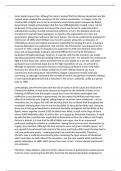Essay
Source question essay - Britain, : conflict, revolution and settlement
- Institution
- PEARSON (PEARSON)
An A-grade response to a source question comparing Julian Hoppit and John Morrill's arguments on whether British parliamentary power increased in the period. Great example on how to tackle a source question in general.
[Show more]



